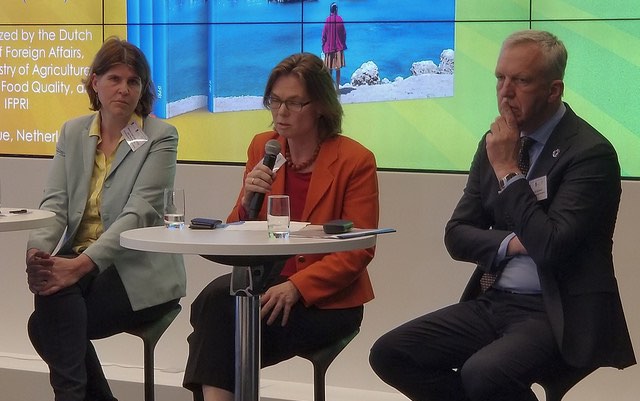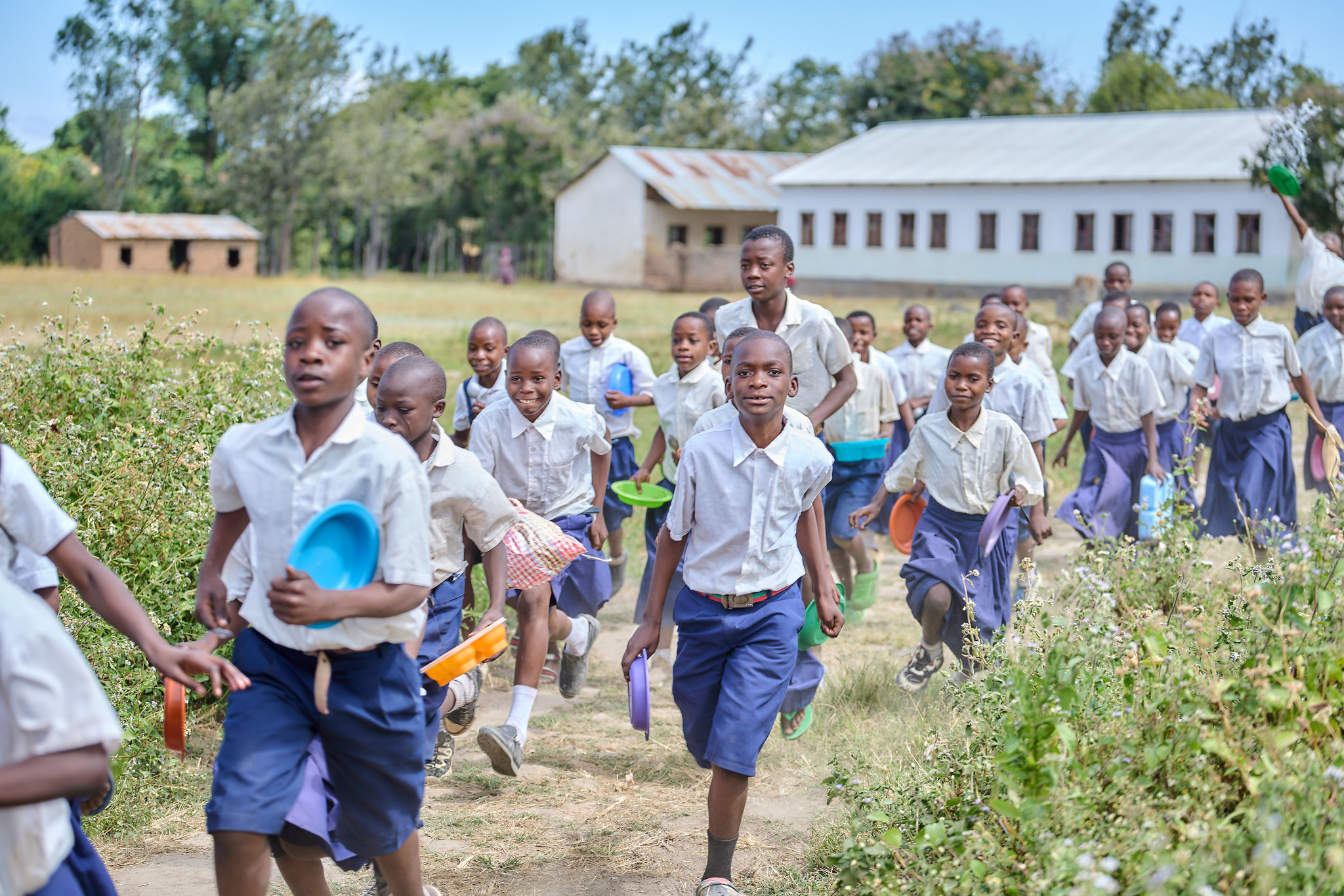Panelists at the April 18 launch event for IFPRI’s 2018 Global Food Policy Report in The Hague explored the shifting terrain of globalization, migration, and food systems, suggesting policy solutions to address inequities and bring a quicker end to global hunger and malnutrition.
Reina Buijs, deputy director-general for International Cooperation at the Dutch Ministry of Foreign Affairs, said she sees a special responsibility for the Netherlands in contributing to food security, given its agricultural knowhow and experience. “We continue to provide leadership and commitment for the SDG’s, including SDG2: Zero hunger,” she said.
Policy makers should focus on facilitating migration for workers, said Remco Oostendorp, professor of international economics at the VU Amsterdam and director of the Amsterdam Centre for World Food Studies. “It’s not the goods, but the labor mobility that is most inefficient in international trade,” he said. “And international players should invest more in domestic markets, because this is what increases GDP.” In addition, countries that are successful in the global marketplace typically focus on certain sectors, he said: “I’d like to encourage countries to think carefully about their competitive and dynamic advantage.”
The global trade in agricultural goods and other food items suffers from many inequities, Oostendorp said. “We should think about creating a level playing field for goods that include the externalities in the price,” he said.
Food value chains don’t exist in isolation, but are part of larger systems with their own problems, SNV Netherlands Development Organization CEO Meike van Ginneken noted. (Read her post on the launch event here.) “You can’t work on better value chains if the bigger problems are not addressed,” she said. “Food systems depend more on non-sector support policies in the north, such as migration and trade, than on agriculture and food policies.”
Van Ginneken emphasized the importance of equal access to information and knowledge. “But data alone is not sufficient,” she said, “data need to be translated.”
She also noted the opportunities and obstacles for women and youth in achieving food security. “Through SNV’s work at the local level, agricultural development results in economic empowerment of producers and consumers. This is when you can empower women, because there is a bigger pie to share. Youth now see agriculture as an unattractive sector to work in. Actively addressing this image problem is something we have not yet done sufficiently.”
Marit Maij, special envoy for Migration at the Ministry of Foreign Affairs, said that policy makers need more data and evidence to understand the connections between migration and food security. “Our ideas and the public debate about migration are barely evidence-based. We need to share more thoughts and data about migration and its root causes,” she said. “For example, in-kind food aid provided by donors often drives out local food producers and suppliers.”
Maij argued for a comprehensive refugee response framework approach, with policies beneficial to both refugees and hosting communities. This includes rights to safety, healthcare, education, and labor rights. (Migrants often work in the agricultural sector.) “And now many southern countries experience rapid population growth,” she said, “key for food security is to pay attention to sexual and reproductive health rights, taking into account cultural sensitivities, and to promote women’s empowerment.”
“Long-term sustainable business models are not a one-way street conducted by investors,” said Atze Schaap, corporate director for Dairy Development at Royal FrieslandCampina, the Dutch multinational dairy cooperative. “The world and market dynamics are changing rapidly. We have to find a way, together with government and NGOs, to deal with this. … It’s not just about product trade, but also about sharing knowledge. Our presence as international company in markets abroad can speed up the development of local farmers.”
He emphasized the importance and the challenges of investing in agricultural development in Asia and Africa. What is needed for that? “Partners who have sufficient information. Commitment of local people who embrace ownership and entrepreneurship. We need local investments, to involve young leaders and realize that the smallholder of today is different from the smallholder of tomorrow,” he said.
“Global hunger is increasing because of conflicts and climate change. We have to make sure poor and hungry people continue to benefit from globalization,” IFPRI Director General Shenggen Fan said, outlining the report’s main findings.
Open trade and international investments are crucial to eliminating hunger, Fan said. “Public-private partnerships can play a key role in realizing agro-infrastructure,” he said, “and in inclusive business models to make sure that investments also benefit smallholders.”
Voluntarily migration and open access to knowledge and data can also contribute to food security, he said. “We face challenges, but if we are empowered by knowledge and data, we can sail through this,” Fan said. But progress also depends on reforms in both domestic farm policy and global governance. “Global governance can provide and protect international public goods,” Fan said. “We should design a governing platform for intergovernmental coordination, decision making and funding.”
Panelists agreed that more evidence-based and comprehensive policies are needed to prepare food systems for the future. “It all starts with more knowledge and better knowing and what is at stake in our complex food systems,” said Aldrik Gierveld, deputy director-general for Agriculture and Nature at the Ministry of Agriculture, Nature and Food Quality. “We need that background to design better policy. There is still a lot we have to do.”
Ida Rademaker is a Junior Policy Officer for Food and Nutrition Security with the Dutch Ministry of Foreign Affairs. Vanessa Nigten is a Knowledge Broker with the Food & Business Knowledge Platform.







